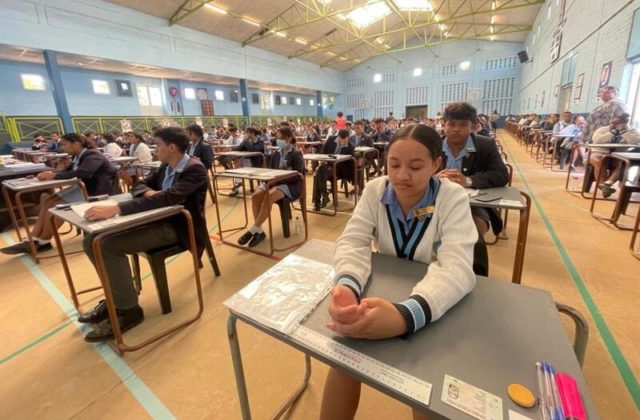On Friday, 189 parents stormed a Northern Cape school, demanding the suspension of a pupil. The school management team was able to manage the situation.
THE DEPARTMENT of Basic Education (DBE) met with stakeholders, teacher unions, professional bodies and school governing body associations on the weekend regarding factors that pose a threat to the administration of the examinations.
DBE director-general Mathanzima Mweli said service delivery protests seemed to be the biggest threat so far to the exams.
“We therefore truly appeal to members of the community to allow the examinations to proceed. The repercussions for not doing so are devastating to the learners and the communities themselves, as it is the children of the same communities that suffer the consequences,” Mweli said.
Dr Rufus Poliah, the chief director of National Assessments and Public Examinations, said that during the first five days of the National Senior Certificate (NSC) exams there had been protest action in at least one province.
On Tuesday last week there was a late start to the examination at 13 centres in the Ngaka Modiri Molema District in the North West due to service delivery protests. A total of 459 candidates were affected but were able to write the examination and they were compensated for the lost time.
However, on the same day, 53 candidates from Phandimfundo Secondary School in Etwatwa, Gauteng, did not write exams due to community protests.
On Friday, 189 parents stormed a Northern Cape school, demanding the suspension of a pupil. The school management team was able to manage the situation.
Poliah said: “I cannot emphasise the negativity that is associated with any protest action. Learners that have gone through 13 years of waiting, anxiously preparing to write an exam, are faced with anxiety and tension on the morning of an examination simply because of an activity and action instigated by members of the community in which our learners are located.”
Poliah said the department had also seen storms and storm damage affecting numerous provinces, including the Northern Cape and the North West.
There was a late start to writing History Paper 1 at three centres in one area in the Northern Cape due to heavy rains, and a late start at one centre in the North West due to floods at the Khuma informal settlement.
The director-general also appealed to learners to stop bringing crib notes and cellphones into examination centres.
Mweli added that the department had to deal with reported cases where some schools denied learners the right to sit for the NSC exams because they were pregnant or because school fees were in arrears.
According to Poliah, a pregnant Western Cape candidate was not allowed to write the English FAL P1 exam at one of the centres, and a Free State candidate was denied access to the exam room at an independent centre due to non-payment of school fees. He said the matter was under investigation.
“A learner who is pregnant shall be allowed to sit for national examinations if her health condition permits. The school principal and staff, in collaboration with parents or guardians, shall take all reasonable steps to accommodate the learner’s learning, health, and maternal needs during the examination period,” Mweli said.
Poliah added that despite ongoing load shedding, the computer applications technology and information technology examinations proceeded well and all candidates were able to write the exam even though 119 centres were affected by load shedding. Poliah said out of the 3,956 candidates affected by load shedding, 14 would need to rewrite.








